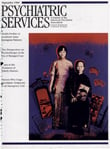Clinicians' judgement of capacity of nursing home patients to give informed consent
Abstract
OBJECTIVE: The study determined the rate of incapacity to give informed consent for medical treatment among patients admitted to a nursing home and assessed whether clinical staff members recognized this incapacity and whether they used alternative means to provide surrogate decision making for their patients' treatment. METHODS: After 44 patients admitted to a nursing home affiliated with a major teaching hospital gave oral consent, two standardized tests, the Hopkins Competency Assessment Test (HCAT) and the Mini Mental State Examination (MMSE) were administered to them. Later a researcher blind to the test results reviewed subjects' clinical records to determine whether staff recognized any incapacity in giving informed consent for medical treatment. RESULTS: Twenty of 44 subjects were identified by the HCAT as incompetent to give informed consent for medical treatment. Clinical staff had identified 13 of those subjects as clinically incompetent. None of the subjects whom clinical staff identified as clinically incompetent was provided with surrogate decision makers in accordance with procedures outlined in state law. CONCLUSIONS: The prevalence of incapacity to give informed consent in the nursing home population was high. Clinical screening by staff did not identify all clinically incompetent patients, and staff had unresolved conflicting opinions about individual patients' capacity to give informed consent. Even when staff recognized a patient's incapacity to give informed consent, proper legal procedures for appointing surrogate decision makers were not followed.
Access content
To read the fulltext, please use one of the options below to sign in or purchase access.- Personal login
- Institutional Login
- Sign in via OpenAthens
- Register for access
-
Please login/register if you wish to pair your device and check access availability.
Not a subscriber?
PsychiatryOnline subscription options offer access to the DSM-5 library, books, journals, CME, and patient resources. This all-in-one virtual library provides psychiatrists and mental health professionals with key resources for diagnosis, treatment, research, and professional development.
Need more help? PsychiatryOnline Customer Service may be reached by emailing [email protected] or by calling 800-368-5777 (in the U.S.) or 703-907-7322 (outside the U.S.).



